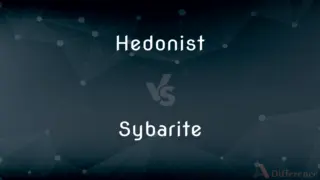Entirety vs. Totality — What's the Difference?
Edited by Tayyaba Rehman — By Maham Liaqat — Updated on April 16, 2024
Entirety refers to the whole of something without exception, often used legally, while totality emphasizes completeness or the sum of all parts.

Difference Between Entirety and Totality
Table of Contents
ADVERTISEMENT
Key Differences
Entirety is often used in legal and formal contexts to denote something in its complete, undivided state. For instance, when referring to 'the entirety of the estate', it implies ownership of all parts without exclusion. On the other hand, totality is frequently used in a broader sense, focusing on the comprehensive amount or extent of something. It conveys a sense of complete or absolute wholeness, like in 'the totality of the circumstances'.
While entirety implies a focus on the state of being whole or undivided, totality often emphasizes the sum of all components that make up the whole. For example, 'the entirety of the book' suggests looking at the book as a single, undivided item, whereas 'the totality of the information' suggests considering all the pieces of information together.
Entirety can also suggest inclusivity of all phases or stages of something. It is used to express that nothing has been left out from a sequence or collection. Conversely, totality can imply a completeness that is often conceptual or used in quantitative assessments, like 'the totality of the evidence' which considers every piece of evidence in a case.
In usage, entirety is typically confined to contexts where the unbroken nature or the full extent of something is under discussion. On the other hand, totality is versatile, often appearing in discussions about the overall impact, scope, or scale of something, such as 'the totality of his works' highlighting the complete output of an artist.
Comparison Chart
Context
Often legal or formal
Broad, including abstract concepts
ADVERTISEMENT
Focus
State of being whole
Sum of all parts
Common Collocations
Entirety of the estate
Totality of circumstances
Implication
Inclusivity of all parts
Completeness, often quantitative
Example Usage
"She received the entirety of the inheritance."
"The totality of the situation was overwhelming."
Compare with Definitions
Entirety
The state of being whole and undivided.
He owns the entirety of the building.
Totality
The whole amount; the entirety.
The totality of the evidence was convincing.
Entirety
The full amount or extent of something.
The entirety of his remark was recorded.
Totality
The result or sum of multiple parts.
Totality in this context means considering all factors.
Entirety
Completely, without exclusion.
The contract was accepted in its entirety.
Totality
Completeness of scope or effect.
The totality of his works spans several genres.
Entirety
In all phases or aspects.
The entirety of the festival was a success.
Totality
In astrological terms, complete coverage during an eclipse.
The next solar eclipse will be visible in totality from several countries.
Entirety
Legal term for whole ownership.
She holds the property in its entirety.
Totality
Universally or wholly.
The law applies in totality across the country.
Entirety
The state of being entire or complete; wholeness
To appreciate the poem, one must read it in its entirety.
Totality
The quality or state of being total
Appalled by the totality of the destruction.
Entirety
The entire amount or extent; the whole
"We rarely remember the entirety of the plot" (Anthony Burgess).
Totality
An aggregate amount; a sum.
Entirety
The whole; the complete or amount.
Due to the early rainout, the game will be replayed in its entirety on Friday.
Totality
The phase of an eclipse when it is total.
Entirety
The state of being entire; completeness; as, entirely of interest.
Totality
The state of being total.
Entirety
That which is entire; the whole.
Totality
An aggregate quantity obtained by addition.
Entirety
The state of being total;
Appalled by the totality of the destruction
Totality
(astronomy) The phase of an eclipse when it is total.
Totality
The quality or state of being total; as, the totality of an eclipse.
Totality
The whole sum; the whole quantity or amount; the entirety; as, the totality of human knowledge.
The totality of a sentence or passage.
Totality
The state of being total;
Appalled by the totality of the destruction
Totality
The quality of being complete and indiscriminate;
The totality of war and its consequences
The all-embracing totality of the state
Totality
The whole amount
Common Curiosities
What does entirety mean in legal documents?
In legal documents, entirety refers to complete ownership or the state of being whole and undivided.
How is totality used in philosophical discussions?
In philosophical discussions, totality is often used to refer to the complete nature or absolute truth of an idea or the universe as a whole.
What does totality mean in the context of an eclipse?
In the context of an eclipse, totality refers to the period during which the moon completely covers the sun, as observed from a particular location.
Is entirety more about quality or quantity?
Entirety is more about quality, emphasizing the undivided and complete nature of something rather than its quantity.
Can totality and entirety be used interchangeably?
While they can sometimes be synonyms, totality often implies a focus on the sum of parts or a quantitative aspect, whereas entirety refers to a state of being whole.
How is entirety used in property law?
In property law, entirety refers to the full ownership of a property by a single entity or shared undivided ownership by multiple parties, such as by a married couple.
What does the phrase "the totality of circumstances" typically mean?
The phrase "the totality of circumstances" refers to considering all relevant factors or aspects in a given situation to form a comprehensive assessment.
What is a common mistake people make when using totality?
A common mistake is using totality to refer to a part rather than the whole, misunderstanding its implication of comprehensiveness.
How does totality relate to holistic approaches in health and wellness?
Totality is often related to holistic approaches in health and wellness, emphasizing the consideration of all factors—physical, mental, emotional, and spiritual—in achieving overall health.
How does the usage of entirety differ from totality in scientific contexts?
In scientific contexts, entirety might refer to the full dataset or whole experiment setup, while totality could refer to the overall conclusions or comprehensive results.
What implications does the use of entirety have in contractual agreements?
In contractual agreements, stating something in its entirety implies that the agreement covers every aspect and detail without exclusion.
Does entirety always imply legal possession?
Not always; while entirety can imply legal possession, it more generally refers to the complete or full state of any item or concept.
How does the usage of entirety affect the tone of a statement?
Using entirety tends to formalize and strengthen a statement, making it sound definitive and complete.
Can the concept of totality apply to subjective experiences?
Yes, totality can apply to subjective experiences, describing a situation where all aspects of an experience are considered to understand its full impact.
When discussing environmental issues, how can the concept of totality be useful?
In environmental issues, using the concept of totality can be useful in addressing the full scope of impacts, including ecological, social, and economic factors, to foster comprehensive solutions.
Share Your Discovery

Previous Comparison
Forzando vs. Sforzando
Next Comparison
Hedonist vs. SybariteAuthor Spotlight
Written by
Maham LiaqatEdited by
Tayyaba RehmanTayyaba Rehman is a distinguished writer, currently serving as a primary contributor to askdifference.com. As a researcher in semantics and etymology, Tayyaba's passion for the complexity of languages and their distinctions has found a perfect home on the platform. Tayyaba delves into the intricacies of language, distinguishing between commonly confused words and phrases, thereby providing clarity for readers worldwide.














































